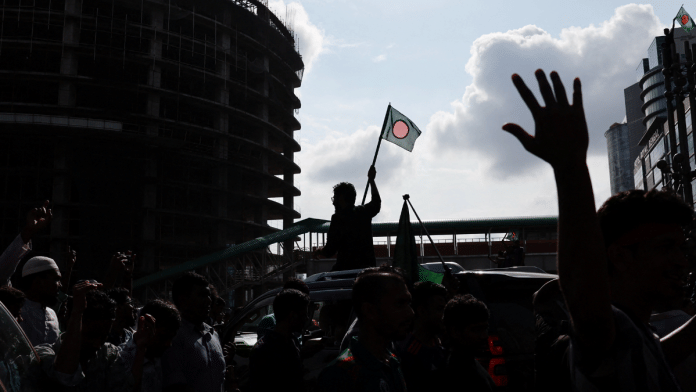Former Bangladesh Prime Minister Sheikh Hasina has, in a sense, tasted her own medicine. The International Crimes Tribunal, the special court she instituted for trials of people accused of crimes against humanity during the 1971 Mukti Juddho, or Liberation War, has sentenced her to death. The verdict was pronounced for her role in the violence and killings during the protests leading to her ouster last year.
While the timing of the 400-plus page verdict on November 17 may have come as a surprise, its nature was not unexpected. The way the tide was turning had been obvious for a while, beginning with the ban on the Awami League in May this year. For those still hoping Hasina might return to Bangladesh, the verdict must now be accepted. Bangladesh has turned a new page, just as it has in the past.
As the domestic populace in Bangladesh must accept the new norms and move on, Dhaka’s neighbours and the wider international community have to do so as well and engage with this latest chapter.
For India, it’s shared history with Bangladesh complicates that acceptance. The emergence of an independent Bangladesh would have been impossible without India’s support and the sacrifice of the Indian Army in 1971. Still, if today’s political leadership chooses to erase or distort that shared history, it becomes futile for any neighbour to keep reminding them of it.
It is for Bangladeshis to decide what suits them best, and any forthcoming leadership will be their call—until elections are not rigged. But any continued longing for the five-decade-old history will only damage the present relationship permanently.
The limited validity of history
The 1971 War of Liberation, like most foundational events concerning a country’s freedom, has reverberated through the ensuing decades in Bangladesh. And been used for political purposes. The glorified history of the Mukti Juddho, which Hasina frequently invoked to evoke nationalist sentiments, was presented in a manner that favoured her version of events.
Only those who accepted that narrative were granted privileges and earned her loyalty. It’s part of what led to the July-August 2024 movement. What the establishment overlooked was a basic historical truth: that history has limited validity, and it fades with each generation.
Be it Bangladesh or Nepal, youth-led movements against established political norms have shown that younger generations do not carry the burden of inherited history. The abolition of the 200-year-old Shah monarchy in Nepal in 2006 and then the overthrow of the KP Sharma Oli government this year, as well as the rejection of the Awami League’s account of the 1971 war, point to the same reality. It all ends one day. If not preserved well, the disconnect between the new and old guards only damages the history.
The glory of 1971 has now receded with Sheikh Hasina’s departure. Last month, a joint declaration, the July Charter, was signed and pronounced by Bangladesh interim chief Muhammad Yunus as the birth of a new Bangladesh. Pledging reforms in governance and the constitution, and the reinstatement of democratic institutions with transparency and justice for all, it could become the new founding pillar of the “Nooton Bangladesh”.
Also Read: Bangladesh has been running a never-ending revenge drama. Hasina is the latest
The new Delhi-Dhaka equation
In response to the Sheikh Hasina verdict, India has, in the best way possible, expressed its commitment to “the best interests of the people of Bangladesh, including in peace, democracy, inclusion and stability in that country”, and its willingness to “engage constructively with all stakeholders”.
This engagement cannot be one-sided, of course. The Muhammad Yunus-led government, and all future elected governments, must be transparent with India on this front. But moving on from 1971 may be the only workable path forward.
Assuming India prepares to move beyond history and build a fresh framework of engagement, Dhaka’s push for Sheikh Hasina’s extradition demands far more diplomatic balancing from Bangladesh than from New Delhi. India has acknowledged the extradition request, but its next steps will depend on how it assesses the legal bona fides of the verdict and the risks the former prime minister may face if she returns.
Additionally, Dhaka must not overlook its geographical location and its role in contributing to regional peace. Even if the new stakeholders are less keen on engaging with India, they must ensure that Bangladeshi territory is not used against the interests of another neighbour—the least expectation one neighbour has from another.
To conclude, the legitimacy of the trial, the verdict, and justice are questions that history will keep open for interpretation. But there is no denying that Sheikh Hasina’s street power was a product of loyalties that were acquired over time using the state apparatus.
It all ends with the verdict, however, and any attempts to revive the Awami League or bring Hasina back to Bangladesh will lead the country into an era of instability, further violence, and chaos.
Rishi Gupta is a commentator on global affairs. Views are personal.
(Edited by Asavari Singh)






